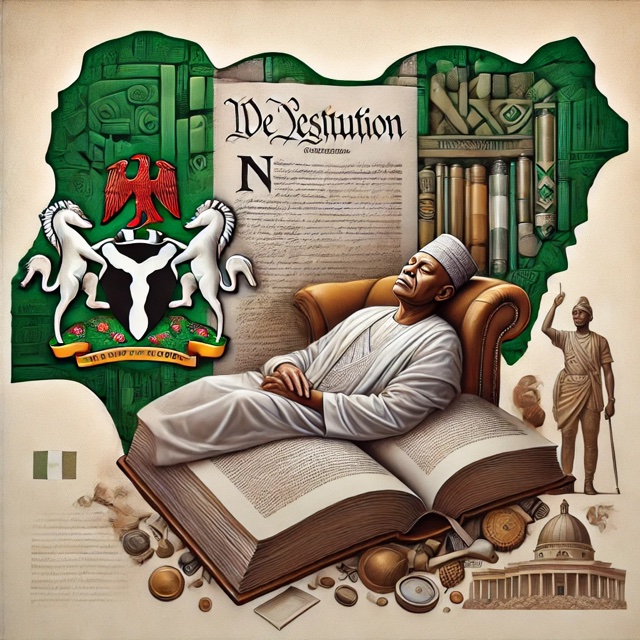
This article was first published on November 12, 2024, on https://constitutionaldiscourse.com/a-game-for-the-throne-the-nigerian-constitution-and-the-removal-of-an-incapacitated-president/

There is no recent case of a head of state removed due to medical incapacitation but there are cases where inability to physically or mentally perform the functions led to resignation from office as was the case of Pope Benedict XVI of the Vatican in 2013, Fidel Castro of Cuba who transferred power to his brother Raúl in 2006, and Boris Yeltsin of Russia who resigned in 1999. In the US, President Woodrow Wilson was incapacitated in 1919 by a stroke but was never formally removed and that was before the 25th amendment was passed in 1967. In Nigeria, President Umar Yaradua, as will be discussed later, was incapacitated due to end-organ failure but was never removed and he died in office.
The Nigerian presidential system of government was created to mimic the US presidential system of government(1), but there are differences between the two, primarily related to the structure of government and the powers of the president. The current Nigerian constitution was enacted on May 5, 1999, and went into effect on May 29, 1999 (hereinafter referred to as the 1999 constitution).
The question examined in this post is what happens when a Nigerian President becomes ill, disabled, or otherwise unable to carry out official duties, in a system where other tiers of government, particularly the judiciary and legislative bodies lack necessary powers of oversight in these terms. This situation thus can lead to scenarios where unelected officials from the sphere of influence of the president in question end up in positions to run the country without being directly answerable to the public.
Nigeria experienced this exact scenario in 2010 when President Yaradua at that time became very ill and was often out of the country for treatment in Germany and later in Saudi Arabia. He died in office(2) due to complications of medical conditions publicized as Asthma and end-stage-renal-disease (for which he required dialysis for many years), and the pattern of the two diseases points to the possibility of the autoimmune Churg-Strauss disease (3). An attempt to remove him from office was met with many difficulties.
The definition of disability is a physical or mental handicap that prevents a person from a full, normal life, activities, or from holding a gainful job.(4) Many neurological or major organ diseases that affect mental acuity and Activities of daily Living (ADLs) are more obvious and are supported by clinical evidence that may point to a possible disability. Therefore, evidence of a president being unable to perform the ADLs, unable to live a full normal life, and being hindered from carrying out activities required to adequately perform his job as a president may point to the possibility that the president may be handicapped and therefore disabled. A clear case of a fitting medical diagnosis will be the best evidence to advance an argument that a president is disabled within the above definition.
The 1999 Nigerian constitution(5) under its section 144 defined what is required to ensure that the Nigerian President ceases to be in power in the case of permanent incapacity.
The first requirement of section 144 is that two-thirds of the Executive Council members of the government should adopt a resolution declaring the President incapable of discharging the functions required for the effective performance of his office and that this declaration be verified by a medical panel established under sub-section 4. (There is likely bias with the associated political exigency that may exist among the people that will need to make the declaration and decisions.) The referenced medical panel shall include the personal physician of the President and four other medical practitioners who have attained a high degree of eminence in the field of medicine pertaining to the medical examination to be conducted in view of section 144 of the 1999 Nigerian constitution, and in accordance with the in the opinion of the President of the Nigerian Senate (6). A verification of this declaration through the report from this medical panel is then sent to the Senate President and the Speaker of the House of Representatives.
The process may also be prone to abuse in a situation where some members of the government’s Executive Council may come together to oust a healthy but non-aligned President as an in-house coup. One possible counter-argument to this is that the President’s personal physician being a member of the panel will prevent such an in-house coup. The fact that the President of the Senate is mandated to appoint four out of the five physicians could be argued to be the basis of further bias on the side of those who are supposed to implement the declaration and decisions.
The defective nature of the 1999 Nigerian constitution is really reflected in the fact that the second step of determining the permanent medical incapacity of the President by the panel of experts should in fact be the first step, as they are in a position to assess whether the President’s condition could affect his function or not.
Historically in Nigeria and even now, the ruling party often holds the majority of parliament by also giving both the Speaker of the House and the Senate, which can lead to a lack of effective and proper enforcement of the provisions of section 144 of the Constitution.
In the 2010 situation with the late President Yaradua, members of his inner cabinet and political insiders delayed invoking section 144 with the hope of preventing his Vice-President from taking office as suggested by the constitutional order of succession and that this delay could last until the next election which was about 15 months away. President Yaradua died in office and his Vice-President, Jonathan Goodluck by law took over as the new President.
The same issue arose with the current President, Bola Ahmed Tinubu, who is often out of the country and has been seen visiting healthcare facilities abroad(7). There are questions if he has medical incapacity and that his wife and son may be the ones running the country through proxies. This is of significance as the Nigerian economy has taken a serious downturn, with the prices of gas and food items increasing by more than 500% since President Tinubu came into office.
The Nigerian system of government along with the constitution was “borrowed” from the US system of government but despite a similar design of constitutional arrangements, the implementation or constitutional practice may very much be different.
Under Section 3 of the 25th Amendment (ratified in 1967) to the US Constitution, “The president can send a written declaration to Congress stating that they are unable to perform their duties….”(8). This section requires the President of the US to voluntarily declare incapacity. There is nothing like this in the Nigerian constitution. Under section 4 of the same Amendment, “The vice president and a majority of the cabinet can initiate a process if they believe the president is unable to perform their duties.” This is similar to section 144 (1)(a) of the Nigerian constitution which states that the president or vice-president shall cease to hold office if “by a resolution passed by two-thirds majority of all the members of the executive council of the Federation it is declared that the President or Vice-President is incapable of discharging the functions of his office.” This similarity does not end there as there is also fear of misuse and that “section 4’s complexity and concern about its potential for misuses have raised questions among observers that it could be implemented for political purposes.”(8) There have been arguments that there are checks and balances under Section 144 of the Nigerian Constitution and Section 4 of the 25th Amendment that will prevent bias or abuse of the process against an unpopular or failed president. There has not, however, been any implementation of this section on presidential disability or incapacity in Nigeria or in the USA.
The Nigerian President at the time he was elected appeared to be frail with slow and slurred speech while denying being ill(9). He has continued to exhibit facial symptoms and slurred speech that have brought his physical fitness to be able to run the country into question on many occasions. Ironically, the President of the US(10), has similar health issues, and in both cases pundits and health commentators have pointed to the possibility of both suffering from Parkinson’s disease. While Parkinson’s disease may not initially affect cognition, it has clinical components of tremors, akinesia/bradykinesia, and rigidity (three core components) that can be physically disabling and affect the day-to-day performance in a job that requires a certain level of physical fitness and agility.
In the US, there are guard rails in the system that will keep the country running smoothly if the President is incapacitated while remaining in office, but such guard rails do not exist in Nigeria, and this can lead to those in the President’s circles of political patronage ending up in positions to run the country as unelected officials to the detriment of the country. We have previously seen this during the time of President Yaradua and President Buhari as well.
The issue of physical disability of a sitting President will always come up if older people are elected to office as it is the case with President Biden and President Tinubu. In conclusion, section 144 of the 1999 Nigerian constitution is adequate to deal with the issue of an incapacitated President in the same way as suggested under section 4 of the 25th Amendment to the US Constitution. There is, however, a need for transparency regarding the health and physical status of the holder of the office of the President. Without this, the constitutional provisions to safeguard and prevent an incapacitated president from remaining in office will be difficult to invoke, especially in Nigeria where there are layers of secrecy around those in government.
________________________________________________________________________________
Bibliography
1. Great A. Redefining the Nigerian System of Government: The Error of a Copied Democracy without True Federalism: Golden Pen; April 2024 [Available from: https://www.scirp.org/journal/paperinformation?paperid=131730.
2. Press A. Nigerian president dies after long illness: NBC News; May 5, 2010 [Available from: https://www.nbcnews.com/id/wbna36974655.
3. Dawodu ST. Walking Through The Shadow of Death, Nigeria and her President: Dawodu.com; Jan 25, 2010 [Available from: http://www.dawodu.com/articles/walking-through-the-shadow-of-death-nigeria-and-her-president-1595.
4. Dictionary M-w. Disability: Merriam-webster; 2024 [Available from: https://www.merriam-webster.com/dictionary/disability.
5. Government N. The Constitution of The Federal Republic of Nigeria 1999: SegunDawodu.com; 1999 [Available from: http://www.segundawodu.com/const.htm.
6. Government N. Constitution of the Federal Republic of Nigeria 1999: Nigeria Law; 1999 [Available from: http://www.nigeria-law.org/ConstitutionOfTheFederalRepublicOfNigeria.htm.
7. Reuters. Nigeria’s president-elect denies being unwell, says resting after campaign: Reuters; March 22, 2023 [Available from: https://www.reuters.com/world/africa/nigerias-president-elect-denies-being-unwell-says-resting-after-campaign-2023-03-22/.
8. Service CR. Presidential Disability Under the Twenty-Fifth Amendment: Constitutional Provisions and Perspectives for Congress: US Congress; July 17, 2024 [Available from: https://crsreports.congress.gov/product/pdf/R/R45394#:~:text=In%20Case%20of%20the%20Removal,both%20of%20the%20President%20and
9. News A. Tinubu travelled for vacation, not ill: Africa News; August, 2023 [Available from: https://www.africanews.com/2023/03/23/tinubu-travelled-for-vacation-not-ill//.
10. Emily Baumgarter PB. Parkinson’s Expert Visited the White House Eight Times in Eight Months: New York Times; July 8, 2024 [Available from: https://www.nytimes.com/2024/07/08/us/politics/parkinsons-expert-white-house.html.
RETURN

From the Powell Memo to Project 2025: How a 1971 Corporate Strategy Became a Global Template for Power In August 1971, a corporate lawyer named L...
The Market’s Mood Ring: How Volatility Across Assets Traces a Hidden Geometry of SentimentIf you want a fast, honest way to describe modern markets,...
Nigeria’s grid collapses are not ‘bad luck’ – They are a design failure, and we know how to fix themFirst published in VANGUARD on February 3,...

Islands of Credibility: Nigeria’s Best Reform Strategy Starts in the StatesFirst published in VANGUARD on January 31, 2026 https://www.vanguard...

Project 2025 Agenda and Healthcare in NigeriaThe US and Nigeria signed a five-year $5.1B Memorandum of Understanding (MoU) on December 19, 2025, to bo...